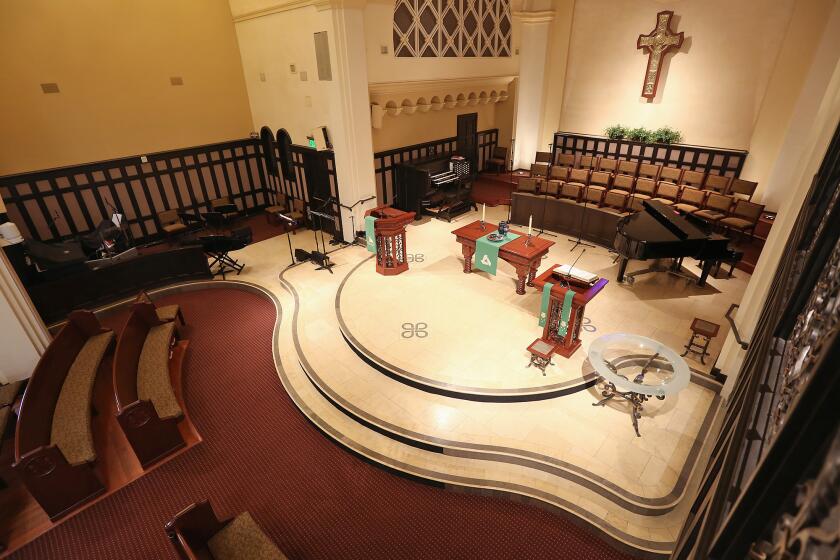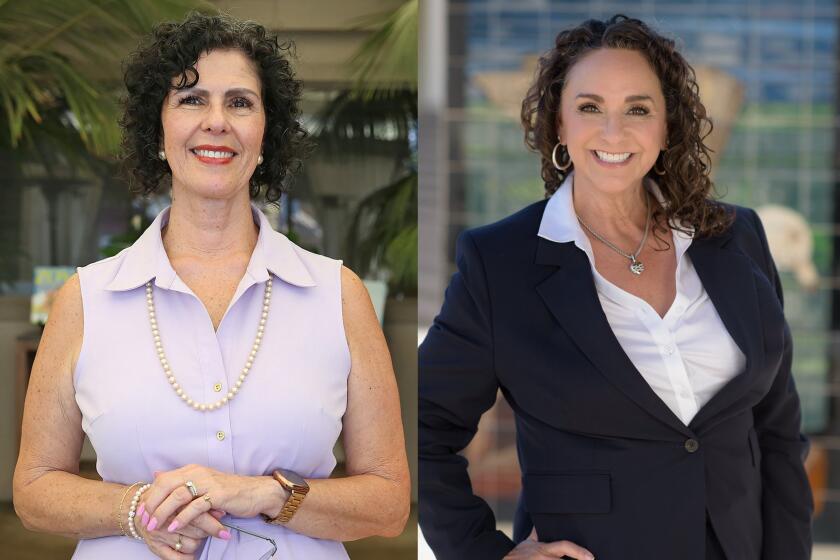IN THEORY:Who should get church property?
An appellate court ruling this week ordered St. James Church, which broke ranks with the Episcopal diocese three years ago, to forfeit its property in Newport Beach. The church severed its ties because its leaders felt the denomination was too liberal in its opinions on homosexuality, the divinity of Jesus and the Bible’s supremacy. The judges ruled that the diocese had the right to take over the property after the split, but church leaders argue that the ruling defies legal precedence. Do you think a congregation should be allowed to hold on to its church after splitting from a denomination?
This deeply sad division seems to me to be the devil’s work focusing us Episcopalians/Anglicans on selfishness rather than on doing God’s work in the world as sisters and brothers in Christ, that is, as the church. That this argument had to take place in civil courts seems tragic.
I trust the appellate court is correct when they decided decisively: “To be plain: Under California Supreme Court cases … the right of the general church in this case to enforce a trust on the local parish property is clear, and that right has not been affected by intervening United States Supreme Court decisions or any statute enacted by the Legislature … Further proceedings shall be consistent with this opinion.”
I agree with statements attributed to Bishop Bruno in last Wednesday’s Los Angeles Times that all people are most welcome to come and go to church for worship as they wish, but no one has the right to take parish property with them when they leave, regardless of why they leave. I especially hope that, as he said, “Now we can get about the business of healing and of being a church.”
I yearn to be the church with St. James’ beloveds.
(THE VERY REV’D CANON)
PETER D. HAYNES
While not qualified to judge the legal ramifications of property ownership, I would weigh in on the religious controversy that precipitated the crisis.
Four rabbis engaged in frequent theological arguments, with three consistently unified against the fourth. Following one argument, which he predictably lost by a 3 to 1 margin, the fourth rabbi appealed to a higher authority.
“Oh, God” he cried. “Give me a sign to prove I am right and they are wrong.” Immediately, a storm cloud appeared, rumbled, and then dissolved. The rabbi pronounced it a sign verifying his position. The other three pointed out that storm clouds form in hot weather.
The rabbi prayed again: “Oh, God, I need a more convincing sign to demonstrate the truth of my position.” When a bolt of lightning slammed into a nearby tree, the three rabbis insisted it was perfectly natural.
Finally, the sky turned black, the earth trembled, and a basso profundo voice from above intoned, “He’s right.” The rabbi put his hands on his hips, turned to the other three, and said, “Well?”
“So?,” shrugged the other rabbis, “Now it’s 3 to 2.”
Controversies between religious faiths often pale compared to dissension within religious faiths; inter-religious wars are often more easily resolvable than intra-religious conflicts.
RABBI MARK S. MILLER
This question is particularly interesting given the fact that a couple of years before I was called to Fairview Community Church, my congregation and the Southwest Region of the American Baptist Churches chose to part ways.
Our church left for the exact opposite reason that St James left the Episcopal Church. However, Fairview did not choose to leave the denomination entirely, though it became member church of the Evergreen Assn. of the American Baptist Churches. While it is heartbreaking that St. James’s members chose to leave the Episcopal Church, they should be commended for standing up for what they believe in. However, a church that chooses to sever ties to its denomination must also take responsibility that their decision may mean severing ties to their property as well.
This is not easy, for even as I believe in autonomy, if the denomination holds the deed, then it’s the denomination’s right to maintain the church.
REV. SARAH HALVERSON
All the latest on Orange County from Orange County.
Get our free TimesOC newsletter.
You may occasionally receive promotional content from the Daily Pilot.



